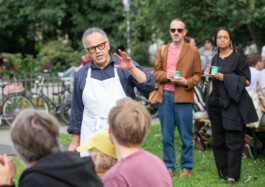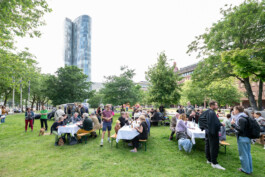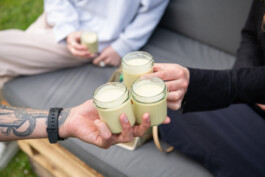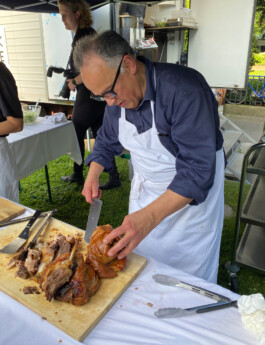


PERFORMING HOMES
EIN PERFORMATIVES PROGRAMM ZUR AKTUALITÄT DES HEIMATBEGRIFFS
Mira Mann, Nicholas Grafia, Mikołaj Sobczak, Nip Slip, Lola von der Gracht, Moritz Krauth, Claudia Hübbecker, Arpad Dobriban u.a.m.
ARPAD DOBRIBAN
„Innige Verbindung – Tiefe Verbundenheit II.“
8.6.2024, 18.00 Uhr
Graf-Adolf-Platz (Eröffnung)
Eine Speisefolge zum Thema „Heimat“ von Arpad Dobriban
Heimat bezeichnet ursprünglich ein Gebiet, das einem vertraut ist und einen ernährt. Ernährung ist die innigste Verbindung zwischen Mensch und Landschaft. Aus der beständigen Wiederholung des für gut Befundenen entsteht das, was wir Traditionelle Küche nennen. Ein angemessener Umgang mit den verfügbaren Pflanzen und Tieren.
Home originally refers to an area that is familiar and nourishes you. Food is the most intimate connection between man and landscape. What we call traditional cuisine arises from the constant repetition of what is found to be good. An appropriate use of the available plants and animals.
PERFORMING HOMES
Die Frage, was Heimat gerade für die jüngere Generation, die LGBTQ+ Community oder auch im Umfeld von Migration bedeutet, untersucht das komplexe Programm „Performing Homes“ mit Unterstützung des Ministeriums für Heimat auf dem Graf-Adolf-Platz, der damit zum Zentrum der Ausstellung „EINE STRASSE“ wird. Auf dem neu gestalteten wie weitgehend ungenutzten Platz zwischen KÖ und GAP 15 entsteht ein virulentes Zentrum, das mit Arbeiten der Künstlerkollektive Atelier Van Lieshout und KUNSTrePUBLIK, aber auch einem Projekt von Fridays For Future mit der HSD Düsseldorf und anderen bürgerschaftlich engagierten Gruppen die Bühne für ein komplexes Programm mit Performances, Lesungen, Screenings und Gesprächen bildet.
Heimat als Ausstellung
Weithin sichtbar stellt das große Zelt „VVest Life“ des Künstlerkollektivs KUNSTrePublik aus Berlin als skulpturales Zeichen eine öffentliche Bühne für Fragen nach der Bedeutung des Heimatbegriffs für Menschen auf der Flucht, in Dauervertreibung oder auch im Zusammenhang mit selbst gewählter Migration zur Verfügung. Die Installation von Fridays for Future und Extinction Rebellion, die in einer Kooperation mit der HSD Düsseldorf und der Klasse von Prof. Martin Pfeifle entsteht, thematisiert den Planeten als „Heimat Erde“. Denn ökologische Problematiken fragen längst danach, wie wir uns ein Zuhause in Zukunft nicht nur vorstellen, sondern auch erhalten, schützen und teilen können. Atelier Van Lieshout verweist als dritter Anker des Heimatdiskurses am Graf-Adolf-Platz mit „Darwin“ aus ganz anderer Richtung und mit viel Humor auf Herkunft, Heim und Heimat. Die autarke Wohnzelle, die eine komplexe Assoziationskette zwischen evolutionären und pränatalen Fantasien bis hin zu autonomen und postapokalyptischen Visionen in Gang setzt, öffnet den Blick auf eine Diskussion zum Heimatbegriff, die sicher mehr Offenheit braucht.
Performanceprogramm
Gerade in Performances aus dem Umfeld der LGBTQ+ Community und anderen Szenen wird die Frage nach Heimat und Herkunft vielmehr als Frage nach verschiedenen Formen des Zuhause-Seins in der Welt interpretiert, werden festgeschriebene Begriffe hinterfragt, transformiert und neu verhandelt. Performances von Nicholas Grafia und Mikołaj Sobczak, Moritz Krauth oder Mira Mann entprovinzialisieren und aktualisieren den Begriff dabei jenseits von Patriotismus, Vaterland oder Rassismus, ohne geopolitische und territoriale Feindschaft. Sie beschreiben sie als einen phantasmatischen Ort in der Vergangenheit, der aktualisiert werden muss, aber auch als einen Ort im Hier und Jetzt – in der Welt, in der wir leben.
Lesungen, Diskussion, Screening
Dazu zeigen theatrale Lesungen wie jene von Claudia Hübbecker am Heine-Monument von Bert Gerresheim, dass die Diskussionen um das Thema Heimat nicht neu sind. Arpad Dobriban, der seine Speisefolgen auch immer vor dem Hintergrund seiner Heimat Ungarn und dortiger lokaler Erzeugnisse inszeniert, zeigt in seinem performativen Buffet, wie eng Geschmack und Nahrung mit Heimat als erstem Ort in der Welt verknüpft ist. Und in einer Diskussion mit Basel Al Ali und weiteren Gästen fragen wir, ob man auf der Flucht vor Krieg und Verfolgung die Heimat endgültig und allumfassend verlässt. Eine Filmrolle, die verschiedene Positionen zum Thema Heimat zeigt, bringt das Thema auch in das Atelier als letztem Kino der Graf-Adolf- Straße, die früher das Zuhause zahlreicher Filmpaläste war.
Performing Homes, Installationen und Programm am Graf-Adolf-Platz


PERFORMING HOMES
Mira Mann, Nicholas Grafia, Mikołaj Sobczak, Nip Slip, Lola von der Gracht, Moritz Krauth, Claudia Hübbecker, Arpad Dobriban
Performing Homes
A performative programme on the topicality of the concept of home The complex „Performing Homes“ programme on Graf-Adolf-Platz, which thus becomes the centre of the „EINE STRASSE“ exhibition, examines the question of what home means, especially for the youn- ger generation, the LGBTQ+ community or in the context of migration. On the newly designed and largely unused square between KÖ and GAP 15, a virulent centre is being created, which, with works by the artist collectives Atelier Van Lieshout and KUNSTrePUBLIK, but also a project by Fridays For Future with HSD Düsseldorf and other civi- cally engaged groups, forms the stage for a complex programme of performances, readings, screenings and talks.
Questions about home as an exhibition
Visible from afar, the large tent „VVest Life“ by the artist collective KUNSTrePublik from Berlin is a sculptural symbol that provides a public stage for questions about the meaning of the concept of home for people on the run, in permanent displacement or in connection with self-chosen migration. The installation by Fridays for Future and Extinction Rebellion, which is being created in cooperation with the HSD Düsseldorf and the class of Prof. Martin Pfeifle, thematises the planet as „Home Earth“. Ecological problems have long been asking how we can not only imagine a home in the future, but also preserve, protect and share it. Atelier Van Lieshout is the third anchor of the home discourse at Graf-Adolf-Platz with „Darwin“, which takes a completely different approach to origin, home and homeland with a great deal of humour. The self-sufficient living cell, which sets in motion a complex chain of associations ranging from evolutionary and prenatal fantasies to autonomous and post-apocalyptic visions, opens up a di- scussion on the concept of home that certainly needs more openness.
Performance programme
Especially in performances from the LGBTQ+ community and other scenes that interpret the question of home and origin more as a ques- tion of different forms of being at home in the world, established con- cepts are scrutinised, transformed and renegotiated. Performances by Nicholas Grafia and Mikołaj Sobczak, Moritz Krauth and Mira Mann de-provincialise and update the concept beyond patriotism, fatherland or racism, without geopolitical and territorial enmity. They describe it as a phantasmatic place in the past that needs to be actu- alised, but also as a place in the here and now - in the world in which we live.
Readings, discussion, screening
In addition, theatrical readings such as the one by Claudia Hübbe- cker on Bert Gerresheim‘s Heinemonument show that discussions on the subject of home are not new. Arpad Dobriban, who always stages his food sequences against the backdrop of his native Hungary and local produce, shows in his performative buffet how closely flavour and food are linked to home as the first place in the world. And in a discussion with Basel Al Ali and other guests, we ask whether fleeing war and persecution means leaving one‘s homeland permanently and comprehensively. A film reel showing various positions on the subject of home also brings the subject to the Atelier as the last cinema on Graf-Adolf-Straße, which was once home to numerous film palaces.
PERFORMING HOMES
EIN PERFORMATIVES PROGRAMM ZUR AKTUALITÄT DES HEIMATBEGRIFFS
Mira Mann, Nicholas Grafia, Mikołaj Sobczak, Nip Slip, Lola von der Gracht, Moritz Krauth, Claudia Hübbecker, Arpad Dobriban u.a.m.
ARPAD DOBRIBAN
„Innige Verbindung – Tiefe Verbundenheit II.“
8.6.2024, 18.00 Uhr
Graf-Adolf-Platz (Eröffnung)
Eine Speisefolge zum Thema „Heimat“ von Arpad Dobriban
Heimat bezeichnet ursprünglich ein Gebiet, das einem vertraut ist und einen ernährt. Ernährung ist die innigste Verbindung zwischen Mensch und Landschaft. Aus der beständigen Wiederholung des für gut Befundenen entsteht das, was wir Traditionelle Küche nennen. Ein angemessener Umgang mit den verfügbaren Pflanzen und Tieren.
Home originally refers to an area that is familiar and nourishes you. Food is the most intimate connection between man and landscape. What we call traditional cuisine arises from the constant repetition of what is found to be good. An appropriate use of the available plants and animals.
PERFORMING HOMES
Die Frage, was Heimat gerade für die jüngere Generation, die LGBTQ+ Community oder auch im Umfeld von Migration bedeutet, untersucht das komplexe Programm „Performing Homes“ mit Unterstützung des Ministeriums für Heimat auf dem Graf-Adolf-Platz, der damit zum Zentrum der Ausstellung „EINE STRASSE“ wird. Auf dem neu gestalteten wie weitgehend ungenutzten Platz zwischen KÖ und GAP 15 entsteht ein virulentes Zentrum, das mit Arbeiten der Künstlerkollektive Atelier Van Lieshout und KUNSTrePUBLIK, aber auch einem Projekt von Fridays For Future mit der HSD Düsseldorf und anderen bürgerschaftlich engagierten Gruppen die Bühne für ein komplexes Programm mit Performances, Lesungen, Screenings und Gesprächen bildet.
Heimat als Ausstellung
Weithin sichtbar stellt das große Zelt „VVest Life“ des Künstlerkollektivs KUNSTrePublik aus Berlin als skulpturales Zeichen eine öffentliche Bühne für Fragen nach der Bedeutung des Heimatbegriffs für Menschen auf der Flucht, in Dauervertreibung oder auch im Zusammenhang mit selbst gewählter Migration zur Verfügung. Die Installation von Fridays for Future und Extinction Rebellion, die in einer Kooperation mit der HSD Düsseldorf und der Klasse von Prof. Martin Pfeifle entsteht, thematisiert den Planeten als „Heimat Erde“. Denn ökologische Problematiken fragen längst danach, wie wir uns ein Zuhause in Zukunft nicht nur vorstellen, sondern auch erhalten, schützen und teilen können. Atelier Van Lieshout verweist als dritter Anker des Heimatdiskurses am Graf-Adolf-Platz mit „Darwin“ aus ganz anderer Richtung und mit viel Humor auf Herkunft, Heim und Heimat. Die autarke Wohnzelle, die eine komplexe Assoziationskette zwischen evolutionären und pränatalen Fantasien bis hin zu autonomen und postapokalyptischen Visionen in Gang setzt, öffnet den Blick auf eine Diskussion zum Heimatbegriff, die sicher mehr Offenheit braucht.
Performanceprogramm
Gerade in Performances aus dem Umfeld der LGBTQ+ Community und anderen Szenen wird die Frage nach Heimat und Herkunft vielmehr als Frage nach verschiedenen Formen des Zuhause-Seins in der Welt interpretiert, werden festgeschriebene Begriffe hinterfragt, transformiert und neu verhandelt. Performances von Nicholas Grafia und Mikołaj Sobczak, Moritz Krauth oder Mira Mann entprovinzialisieren und aktualisieren den Begriff dabei jenseits von Patriotismus, Vaterland oder Rassismus, ohne geopolitische und territoriale Feindschaft. Sie beschreiben sie als einen phantasmatischen Ort in der Vergangenheit, der aktualisiert werden muss, aber auch als einen Ort im Hier und Jetzt – in der Welt, in der wir leben.
Lesungen, Diskussion, Screening
Dazu zeigen theatrale Lesungen wie jene von Claudia Hübbecker am Heine-Monument von Bert Gerresheim, dass die Diskussionen um das Thema Heimat nicht neu sind. Arpad Dobriban, der seine Speisefolgen auch immer vor dem Hintergrund seiner Heimat Ungarn und dortiger lokaler Erzeugnisse inszeniert, zeigt in seinem performativen Buffet, wie eng Geschmack und Nahrung mit Heimat als erstem Ort in der Welt verknüpft ist. Und in einer Diskussion mit Basel Al Ali und weiteren Gästen fragen wir, ob man auf der Flucht vor Krieg und Verfolgung die Heimat endgültig und allumfassend verlässt. Eine Filmrolle, die verschiedene Positionen zum Thema Heimat zeigt, bringt das Thema auch in das Atelier als letztem Kino der Graf-Adolf- Straße, die früher das Zuhause zahlreicher Filmpaläste war.
Performing Homes, Installationen und Programm am Graf-Adolf-Platz
PERFORMING HOMES
Mira Mann, Nicholas Grafia, Mikołaj Sobczak, Nip Slip, Lola von der Gracht, Moritz Krauth, Claudia Hübbecker, Arpad Dobriban
Performing Homes
A performative programme on the topicality of the concept of home The complex „Performing Homes“ programme on Graf-Adolf-Platz, which thus becomes the centre of the „EINE STRASSE“ exhibition, examines the question of what home means, especially for the youn- ger generation, the LGBTQ+ community or in the context of migration. On the newly designed and largely unused square between KÖ and GAP 15, a virulent centre is being created, which, with works by the artist collectives Atelier Van Lieshout and KUNSTrePUBLIK, but also a project by Fridays For Future with HSD Düsseldorf and other civi- cally engaged groups, forms the stage for a complex programme of performances, readings, screenings and talks.
Questions about home as an exhibition
Visible from afar, the large tent „VVest Life“ by the artist collective KUNSTrePublik from Berlin is a sculptural symbol that provides a public stage for questions about the meaning of the concept of home for people on the run, in permanent displacement or in connection with self-chosen migration. The installation by Fridays for Future and Extinction Rebellion, which is being created in cooperation with the HSD Düsseldorf and the class of Prof. Martin Pfeifle, thematises the planet as „Home Earth“. Ecological problems have long been asking how we can not only imagine a home in the future, but also preserve, protect and share it. Atelier Van Lieshout is the third anchor of the home discourse at Graf-Adolf-Platz with „Darwin“, which takes a completely different approach to origin, home and homeland with a great deal of humour. The self-sufficient living cell, which sets in motion a complex chain of associations ranging from evolutionary and prenatal fantasies to autonomous and post-apocalyptic visions, opens up a di- scussion on the concept of home that certainly needs more openness.
Performance programme
Especially in performances from the LGBTQ+ community and other scenes that interpret the question of home and origin more as a ques- tion of different forms of being at home in the world, established con- cepts are scrutinised, transformed and renegotiated. Performances by Nicholas Grafia and Mikołaj Sobczak, Moritz Krauth and Mira Mann de-provincialise and update the concept beyond patriotism, fatherland or racism, without geopolitical and territorial enmity. They describe it as a phantasmatic place in the past that needs to be actu- alised, but also as a place in the here and now - in the world in which we live.
Readings, discussion, screening
In addition, theatrical readings such as the one by Claudia Hübbe- cker on Bert Gerresheim‘s Heinemonument show that discussions on the subject of home are not new. Arpad Dobriban, who always stages his food sequences against the backdrop of his native Hungary and local produce, shows in his performative buffet how closely flavour and food are linked to home as the first place in the world. And in a discussion with Basel Al Ali and other guests, we ask whether fleeing war and persecution means leaving one‘s homeland permanently and comprehensively. A film reel showing various positions on the subject of home also brings the subject to the Atelier as the last cinema on Graf-Adolf-Straße, which was once home to numerous film palaces.





Ein Projekt von
MAP Markus Ambach Projekte
Kunstkommission Düsseldorf
ISG Graf-Adolf-Straße
Ein Projekt von
MAP Markus Ambach Projekte
Kunstkommission Düsseldorf
ISG Graf-Adolf-Straße